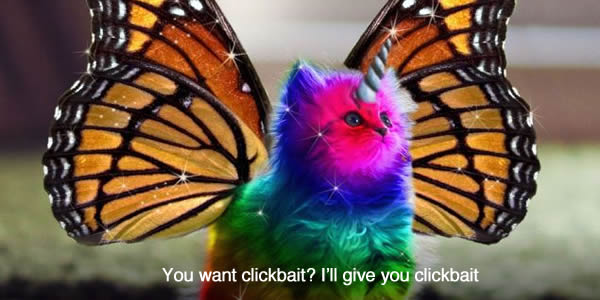Last week the Morgan Foundation submitted to Wellington City Council with the idea of managing cats in sensitive wildlife areas. This would involve micro-chipping, so that owned cats could be returned to their owners. We think it isn’t actually that controversial as far as ideas go, however this sensational headline appeared in the Herald on Friday:
Gareth Morgan: Euthanasia for cats in wildlife areas
This resulted in tweets like this:
GARETH MORGAN WANTS TO MURDER YOUR BELOVED PET CAT – READ THIS! http://t.co/eBJqzINhdU via @nzherald
— The Hippie Cruiser (@TheHippyCruiser) March 21, 2015
The Dom Post/ Stuff reporter opted for this more sedate version:
In the quest for clicks and the all-important advertising dollar, attention-grabbing headlines are increasingly becoming the norm. But when do they cross the line of being plainly inaccurate? Here’s ten more accurate headlines they could have used instead:
1. Morgan suggests managing cats like dogs
Probably the most accurate headline, as we are suggesting nothing different from how we deal with dogs already: owned cats would be micro-chipped and registered. Then any cats found wandering in sensitive wildlife areas could be returned to their owners if they have a microchip. If they don’t, they could be rehomed or humanely euthanised. That’s exactly how we deal with dogs right now, right across the nation.
2. Morgan suggests innovative way to stop owned cats being killed in wildlife areas
Not only is the Herald headline misleading, but the first paragraph of the article is just wrong:
Lock up your moggies if you live near a sensitive wildlife area, or they could be put down – that’s the latest suggestion from Gareth Morgan’s environmental group in its bid to stop cats harming native birds.
Actually, cats are already killed in sensitive wildlife areas, such as on DOC and Council land. Usually these are feral cats, but as we have seen in Auckland lately, occasionally owned cats are killed too. If micro-chipping was the norm, then owned cats could be returned to their owners safe and sound.
3. Morgan suggests ground breaking way to protect birds
Ultimately this is what the plan is about, protecting our native wildlife.
4. Morgan’s plan to cat-ch up with Australia
We love to compare ourselves with our cousins across the ditch, and lament how far behind we are in living standards. Well, cat management is another example where we lag behind. Micro-chipping and registering cats is the norm in Australia, feeding strays is discouraged and in sensitive wildlife areas nighttime or 24hr curfews are common. In other words – cats have to stay on their owner’s property.
5. Morgan finds way to save lizards and end the housing crisis
Over the weekend Duncan Garner lamented how concern over lizards had held up building a new house. Anything that gets in the way of building houses is a sure fire headline – so why don’t we manage cats instead of stopping building houses?
Cats are a particularly voracious predator of skinks and geckos. Recent evidence suggests that the damage is far bigger than previously thought as cats tend to eat lizards rather than bringing them home to show their owner. During a pilot video study in Wellington, the cats involved killed an average of one lizard each per day.
Cats do far more damage to our lizard population than new houses, so managing cats as we are suggesting would do a better job of protecting lizards than stopping new houses being built. Housing and cats – that has to be the ultimate headline for the Herald to run.
6. Morgan cat plan to create thousands of new jobs
Cat management would create thousands of new jobs. Dog control is now a strong part of council services, whereas cat control is left to do-good volunteers operating on the smell of an oily rag. And if owners were encouraged to keep their cats on their property, this would spur a huge investment in indoor cat toys, cat proof fencing, outdoor cat enclosures, and, of course, kitty litter.
7. Morgan’s cunning plan to combat mental illness
Unlike any other owned animal, cats are free to roam, damage property and spread diseases like toxoplasmosis. Cat management would reduce this risk.
8. Morgan likes cats after all
Micro-chipping cats and stopping them from wandering is actually better for the welfare of cats. That is why some vets and cat protection groups submitted to Wellington City Council with similar ideas to those we put forward.
9. Morgan suggests simple way to stop squandering taxpayer and ratepayer millions
Through DOC and Regional Councils, New Zealand is spending millions of dollars managing three of the predators that threaten native wildlife – stoats, rats and possums. Yet we do nothing at all about the fourth – cats. Quite simply all the money we spend on conservation is a waste – particularly near cities – if we don’t manage cats. Just look at the recent example of one cat slaughtering 18 tui in Miramar. Stories like this will become more common as native wildlife returns to our cities.
10. Morgan suggests way to end scourge of feral cats
People have problems with stray and feral cats destroying their property, spreading disease and injuring their pet cats. Without a way to identify owned cats, it is impossible to do anything about this problem. Micro-chipping and registering owned cats would allow Councils to deal with the stray and feral cat problem where it exists, without the risk of accidentally knocking off anyone’s pet moggie.

